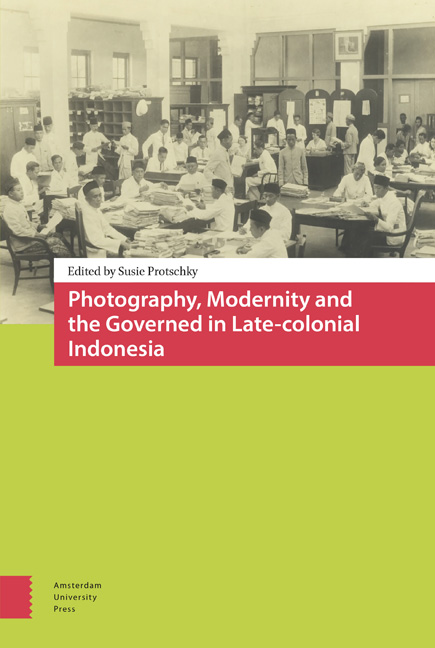Book contents
- Frontmatter
- Contents
- Acknowledgments
- Part I Governing Lenses on Ethical Policy and Practice
- 1 Camera Ethica: Photography, modernity and the governed in late-colonial Indonesia
- 2 Ethical policies in moving pictures: The films of J.C. Lamster
- 3 Ethical projects, ethnographic orders and colonial notions of modernity in Dutch Borneo: G.L. Tichelman's Queen's Birthday photographs from the late 1920s
- 4 Saving the children?: The Ethical Policy and photographs of colonial atrocity during the Aceh War
- Part II Local Lenses on Living in an “Ethical” Indies
- 5 Interracial unions and the Ethical Policy: The representation of the everyday in Indo-European family photo albums
- 6 Reversing the lens: Kartini's image of a modernised Java
- 7 Modelling modernity: Ethnic Chinese photography in the ethical era
- 8 Modernity and middle classes in the Netherlands Indies: Cultivating cultural citizenship
- 9 Say “cheese”: Images of captivity in Boven Digoel (1927-43)
2 - Ethical policies in moving pictures: The films of J.C. Lamster
Published online by Cambridge University Press: 11 December 2020
- Frontmatter
- Contents
- Acknowledgments
- Part I Governing Lenses on Ethical Policy and Practice
- 1 Camera Ethica: Photography, modernity and the governed in late-colonial Indonesia
- 2 Ethical policies in moving pictures: The films of J.C. Lamster
- 3 Ethical projects, ethnographic orders and colonial notions of modernity in Dutch Borneo: G.L. Tichelman's Queen's Birthday photographs from the late 1920s
- 4 Saving the children?: The Ethical Policy and photographs of colonial atrocity during the Aceh War
- Part II Local Lenses on Living in an “Ethical” Indies
- 5 Interracial unions and the Ethical Policy: The representation of the everyday in Indo-European family photo albums
- 6 Reversing the lens: Kartini's image of a modernised Java
- 7 Modelling modernity: Ethnic Chinese photography in the ethical era
- 8 Modernity and middle classes in the Netherlands Indies: Cultivating cultural citizenship
- 9 Say “cheese”: Images of captivity in Boven Digoel (1927-43)
Summary
The ethical course in colonial policy
There were as many dimensions to the Ethical Policy as there were proponents. Indeed it was a complex of ideas, a set of related policies characterising a thought world. The term “Ethical Policy” is peculiarly associated with Pieter Brooshooft (1845-1921), whose booklet by that name was published in Amsterdam in 1901. In it Brooshooft outlined a colonial policy whose guiding principles should be: separation of the colony's finances and governance from the Netherlands; primacy of indigenous interests in all policy formulation; Indies government management of the economy; increased numbers of Western-educated Javanese in the bureaucracy; and greater delegation of responsibility to indigenous officials.
These were not new principles growing out of a novel analysis, but rather the drawing together of a cluster of ideas, grievances and demands stretching back many years. Indeed, Rob Nieuwenhuys identifies frank criticism of Dutch administration as the enduring characteristic of Dutch writing on the archipelago. From the middle of the nineteenth century, critics focused on the colonial economy and repressive character of the Indies government. Van den Bosch's economic measures, introduced in 1830 for increasing agricultural production, exports and profits for the Netherlands, had been in place for two decades, allowing considered evaluation. Clergyman and journalist W.R. van Hoëvell concluded, from observations on his travels through Java, that the Cultivation System burdened Javanese farmers with long working hours and heavy taxes. He became a constant critic of colonial management in the Indies and subsequently in the Dutch Parliament.
Van Hoëvell and Multatuli (Eduard Douwes Dekker, 1820-1887) figure prominently in accounts of the nineteenth-century colony, but lesser known critics also petitioned the colonial administration for change. Lawyer Pelgrom Charles Ardesch (1800-1852), for instance, demanded freedom of the press, an end to autocratic forms of government, reform of the Indies currency, cancellation of the Netherlands Trading Company's monopoly on trade and shipping between colony and the Netherlands, and abolition of slavery in 1848. Nieuwenhuys says of government official L.
- Type
- Chapter
- Information
- Publisher: Amsterdam University PressPrint publication year: 2015
- 1
- Cited by

